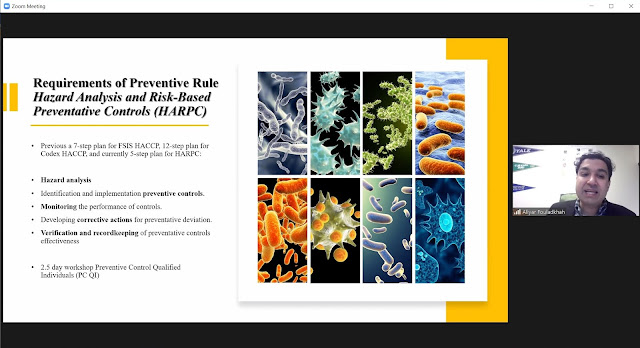Certifying Preventive Controls for Human Food in Haiti and Guatemala
Between November 23rd and 25th, 2020 the Farmer-to-Farmer program in Guatemala held an online certification training on Preventive Control for Human Food, the second of this type in Guatemala. This online workshop will certify 11 young professionals from Guatemala and two members from the Haiti government as Preventive Control Qualified Individuals (PCQI).
This online certification is part of a food safety assignment with Guatemalan host Yogi Super Foods (YSF), which wants to obtain an organic accreditation to sell in the US market. YSF is a Guatemalan social enterprise that specializes in superfoods and has been in business since 2014. The workshop serves as a roadmap for YSF to use the new tools and resources received during the training such as worksheets, workbooks, templates, and manuals to outline its own food safety plan.
The certification was facilitated by Dr. Aliyar Fouladkhah, an Assistant Professor at Tennessee State University, who is also the Director of the Public Health Microbiology Laboratory and the lead instructor for this course in the state of Tennessee. He holds a Ph.D. in meat science and food safety and had recently completed two other Farmer-to-Farmer assignments with Partners of the Americas. The first one was in June 2019, when he traveled to Guatemala for two weeks to evaluate the food safety and manufacture practices of all YSF products and make cost-effective recommendations for improvements to meet international quality standards. This in-person assignment also aimed to prepare the host to achieve USDA Organic certification.
The second one started in June of this year when Dr. Fouladkhah worked remotely with the Ranfòse program in Haiti, which addresses the continuing problem of micronutrient deficiencies in the country by stimulating a national program for fortified staple foods. After the Haitian government adopted a law on food fortification according to which all the salt sold on the market must be iodized, the oil enriched with vitamin A and the flour enhanced with iron, folic acid, zinc and vitamin B; Aliyar supported Ranfòse with the creation of testing protocols and quality assurance manuals for the fortified food products.
Formal PCQI trainings ensure that the certificated individuals are aware of US Federal Regulations, obtain in-depth knowledge on potential hazards and preventive controls, implement and improve their recordkeeping abilities, and receive necessary tools and resources to create their own food safety plans. This certification strengthens the agri-food sector of developing countries so that they can comply with USDA regulations, export their products, and grow their businesses by gaining access to the US market.
Dr. Aliyar said of this assignment: “This is the only curriculum currently approved as adequate by the US Food and Drug Administration for preventive controls for human food. In a post-Food Safety Modernization Act era, each company is required to have at least one PCQI in their operation.” Thanks to Dr. Fouladkhah’s work, 13 new qualified individuals from Guatemala and Haiti will now have the required skills to manufacture, process, and pack food that is safe for consumption and meets international standards while minimizing food safety hazards. This will result in YSF becoming more competitive in local, regional, and international markets; and in a reduction in nutrient deficiency and stunting for vulnerable Haitians.





.png)

Comments
Post a Comment